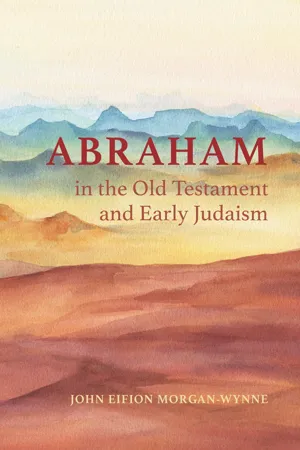![]()
1
Abraham in Paul’s Letter to the Galatians
1.1. General Introduction
Abraham is discussed at some length by the apostle Paul in two of his writings: the Letter to the Galatians and the Letter to the Romans. But the phrase “the seed of Abraham” occurs outside these two letters in 2 Corinthians, in a passage where Paul refers to a rival apostolate who had arrived at Corinth, and whose members were clearly calling themselves members of the “seed of Abraham” as part of the commendation of themselves. Very reluctantly Paul “took them on” on their own approach and, at the beginning of what has come to be known as “the Fool’s Speech” (11:1–12:13), matched their claims, for he too was a Hebrew, an Israelite, a member of the seed of Abraham, a servant of Christ (11:22). The first three items are relative to Jewishness and refer to the position of one who is a member of the elect people of God, who shares in the benefits of all God’s mighty acts on behalf of His people and His promises to them, acts and promises which go back to the founding patriarch of the nation.
While the statement of being a servant of Christ was the climax of this short list, this did not mean that his Jewish advantages were thereby called in question; rather, they were subordinated to what Paul said in explanation of his being a servant of Christ. He went on to point to the persecutions, trials, and dangers which he had suffered as pointers to his weakness which in turn was based on the pattern of Jesus’ own ministry.
For our purpose, the passage is of interest because it shows how important the figure of Abraham and descent from him was regarded in some circles of the early church. It presumably also helped to impress the members of the Corinthian congregation who in all probability comprised some Hellenistic Jews and a majority of Gentile converts. For Paul it was subordinated in significance to living out the death and resurrection of Christ—specifically, of knowing the dying of Christ, or weakness, and, in that very state, also knowing the risen power of Christ given to those who believe, to strengthen them.
1.2. Introduction to the Letter to the Galatians
We shall, then, concentrate on Galatians and Romans. Scholars are in agreement that they were written in that order, but they differ as to the exact chronological relationship of the two letters. Broadly speaking, probably a majority of scholars accept that Galatians was written after Paul had learned about the arrival and activity among the Galatian churches of people representing a decidedly conservative Jewish Christian stance (or the activity of people representing the local Jewish community). This activity had apparently made inroads among Paul’s converts, to his considerable dismay. Romans was written a few months later, and draws up a balance sheet, so to speak, of his thoughts and arguments. Other scholars dissent from this viewpoint and believe that Galatians is probably the earliest extant letter of Paul, written before the Jerusalem Council which was convened to sort out the problems which had arisen because of the mission of the Jewish Christians both to Galatia and to the city of Antioch where Paul was based. In this way, these scholars also hoped to solve one of the problems occasioned by differences between Paul’s accounts of his visits to Jerusalem in Galatians 1–2 and the account of Paul’s visits to Jerusalem in Acts 9, 11, and 15.
It is not necessary for us to get involved in a discussion of this particular knotty problem, which would take up far too much space. Both viewpoints share the conviction that Galatians was written at the height of the crisis in the Galatian churches and with great passion, in order to fend off the influence of some who wanted the Galatians to be circumcised with all that that entailed as regards keeping the Law of Moses, and in order to defend the right of Gentile converts to be part of God’s people without having to submit to all the requirements of the Law. That is sufficient for our purpose.
1.2.1. The Situation in the Galatian Congregations
Since the ...
